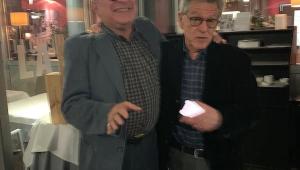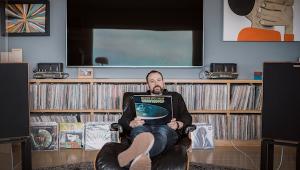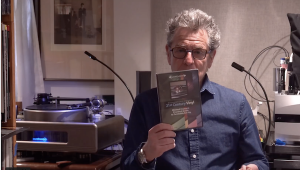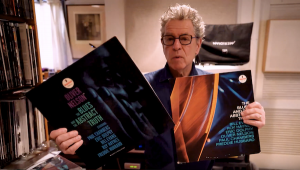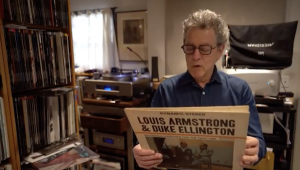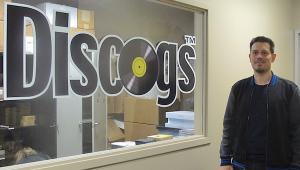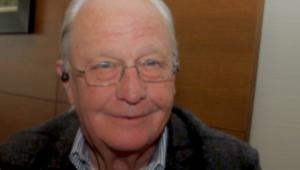We Caught a Rising Star

Back in 1987, I interviewed the young up and coming and not particularly well-known Warner Brothers recording artist Chris Isaak. Thanks to a reasonably successful recording career, an effective and consistent live show, and an unusual “reality”-type comedy series on Showtime, Isaak divides his celebrity between being a respected recording artist, and a campy “celebrity,” known in some quarters simply for being known.
With his swept-back ‘50’s hair and Eddie Cochrane-like haberdashery, Chet Baker-ish schnozz, hollow body electric guitar and especially his shiver-inducing, close-to-the-microphone intimate wail, Isaak was heralded as both a musical throwback and a “new” Roy Orbison at a time when “New Wave,” synth-based “hair bands” still dominated radio airplay.
Unfortunately, while the sound of Isaak’s first two LPs (both issues on vinyl) was not bad by late 1980’s standards, it couldn’t match the sound Bill Porter managed, recording both Roy Orbison and Elvis Presley—an apt comparison since Isaak’s voice hinted at both of them. Ironically, compared to much of today’s Pro-Tools polluted sonic swill, those 1980’s records sound mighty inviting!
However, at the time, I decided to use the interview opportunity to lobby Isaak to pay more attention to sound quality on his next record.
Isaak had recently sold out New York City’s late, lamented Bottom Line, in May and July of 1987, while opening for The Thompson Twins (!) at a much larger venue. Demand swelled for yet another Bottom Line appearance, and when that was scheduled, in August of 1987, so was the interview.
I met with Isaak at Warner Brothers Rockefeller Center headquarters the afternoon of his Bottom Line show (which I was fortunate to attend).The interview and show made clear that while Isaak struck some retro-poses in his looks, dress and music, he was no poseur. He has drawn from the masters, but he hasn’t sucked their musical blood.
Isaak is no musical vampire. On the other hand, he can sometimes be so glib and off-hand, both on stage and in the interviewee’s hot seat, that he takes on a David Letterman-like quality; you aren’t sure whether he’s being serious or doing a well-orchestrated parody.
Other times, you think you’re just experiencing a well-restored, customized version of an old product—like a mint ’57 Chevy that’s been turbocharged. You get the sense that, as an adolescent, Isak sat in his Stockton (California) home listening to early rock and roll on the radio when it was fresh and new, telling himself, “I can do that, and when I grow up, I will.” And he’s still stuck in that musical realm, proving his childhood fantasy.
On stage with his band, Isaak is clearly the group leader. There’s no partnership a la Jagger/Richard between him and guitarist James Calvin Wilsey. There’s no haberdashery democracy either, as there was with the dress-alike early Beatles. Instead, the stage picture consists of bassist Rowland Salley stage-right, Wilsey stage-left, and drummer Kenny Dale Johnson behind on a riser, all dressed in cool grey suits. But Isaak, stage center, wears electric blue lamé.
He could be Conrad Birdie in a summer stock production of Bye Bye Birdie. Or he could come across as even more pathetic. But he doesn’t. And that is part of the fascination. It takes guts to get on stage looking like a parody. It would be so much easier for Isaak to dress in something unique and contemporary. But you get the idea that he feels he must earn his way to the top by retracing the great steps of rock and roll, carrying the white man’s musical burden.
Not that Isaak is on some sort of serious historical quest. His stage persona suggests quite the opposite. He is the most skilled musician-monologist I’ve seen on stage since Springsteen, and a hell of a lot funnier, exhibiting an incisor-like wit, dripping with nasty sarcasm. Isaak isn’t against being the butt of his own humor, but he really shovels it out at the other band members.
Not because of their playing, certainly. Bassist Salley plays fast, clean, muscular, and very deep. Drummer Johnson looks pained throughout the set but delivers hard, though seemingly unsophisticated support a la Ringo Starr, while Wilsey’s guitar rings and shimmers and fills in the sound with grace and taste.
Hearing Chris Isaak and band live only emphasizes the technical inadequacies of his recordings. Will our chat influence his next record? You’ll have to judge that for yourself. But just to be sure, at the end of the interview, I gave Isaak a 90 minute cassette or Presley, Orbison and The Everly Brothers dubbed off my Oracle turntable onto a Nakamichi BX-300. Of course, Isaak was familiar with all of these records. I just didn’t know if he’d heard them properly decoded.
Face to face, I sized Isaak up as a wise guy and prepared myself for a battle of wits. I got one, but in print you’ll have to sometimes read between the lines to experience it. And once Isaak understood the perspective from which I was coming, he dove right in!
CI: Who do you write for?
MF: A high-end audiophile magazine.
CI: That’s what this interview is for?
MF: Yes. I’m the popular music editor.
CI: Popular music? What does that have to do with me?
MF: I’m also the unpopular music editor.
CI: The RCA stuff that Elvis did, I think it’s some of the best sounding…the quality of the sound for the time it was. People always say, “Well nowadays we got the compact disk, we got this and that,” and they say “That stuff doesn’t stand up.” Well, crank that stuff up in your car, and crank up anything else you want to play and it stands up fine!...It’s always interesting, half the time you talk to these guys (older heroes, whether musicians or engineers), and they say, “Yeah, I got that sound, but I don’t want to do that anymore, now we’ve got digital recording…” A lot of times you go back to your hero and you go, “What a great sound you had on those old Gretsches.” And he goes “Gretsch? Peavey, man! Tube amp? Forget the tube amps, we got this new one,” and you kind of just go, “Oh God!”
MF: How conscious are you of sound quality?
CI: Very.
MF: I think you have created a musical and visual image that blends Fifties and Eighties sensibilities into something new, but your recordings tend to produce a sonic clash of values to my ears.
CI: I try to get the Eighties sound. I think that to go back and say I want this to sound like a Fifties recording…There are some aspects of our sound that are old fashioned, or classic, or whatever you want to call it—the vocal being way on top of the mix—trying to leave a lot of space for the guitar, using echoes that are big and clear. My idea of a good echo is a big room sound. I always heard about the RCA building where they used a staircase or the church next door or some- thing. And Buddy Holly recording in a big ballroom, I think. They use actual big space. I like that kind of feeling. But there are certain things they do now on some stuff, for example, the punch of the electronic drums. That real heavy beautiful sound. The clarity of different tracks. I like that. People who don’t have trained ears or who aren’t listening carefully say, “Oh, you don’t use synthesizers and drum machines.” Well, they’re wrong. I’ve used drum machines, synthesizers, I’ve used multi-track and double-track and slave-tracked, cross cut—anyway I can, to get what I want.
MF: Do you think a live album of your performances would be effective?
CI: Could be. Certain songs would be good live, because I have a swinging band and they could cut it live.
MF: Have you thought about cutting a studio album “live”?
CI: I’ve thought about it because I work with Lee Herschberg as an engineer, and he’s worked with just about everybody I think is good, and he’s got so much experience. It’s like question-and-answer period with him. I mean I don’t even know to ask him intelligent questions, half the time. You describe to him what you want, and you get it. But I’d like to make a one-microphone recording with him. One mike in a roomand everybody sings…I’ve always liked recordings where people played live together. If you listen to the old Stones records you can kind of hear where the people in the room were standing, almost.
MF: Even in mono.
CI: It sounds like they’re in a room playing. And now it doesn’t sound like that. It sounds like the singer sings through that little speaker, but they don’t sound like they’re placed in a room, because there’s not an echo that’s all blending into one microphone, anywhere. I like the idea of going for a one-take recording and doing 25 takes, you know?...I bet you could take about 99 percent of the people out there singing today—big stars—and you put them in a one-track recording, and they’d be out of the business. They cannot sing! I think I can sing. There’s a lot of things I don’t have going for me, but I think I can sing.
MF: What don’t you have?
CI: Musically, I don’t know how good a songwriter I’m going to be. And as a singer, I think I have a pretty good voice, but I don’t know about my style. I’m still trying to find my own strong style. In songwriting, when you compare yourself to someone like John Lennon, you feel like shooting yourself.
MF: Everybody does.
CI: I met Roy Orbison. I wish I could have written one of the songs he’s done. I mean, he’s got 15 songs that I haven’t touched that height.
MF: Well you’re on your way. There is a lot of real emotion in your songs, compared to some of the wallpaper that’s out there….you write a lot in minor keys.
CI: I like that. I’ll probably continue to write a lot of stuff in minor key. I really like that sound. It’s up to me to expand. I’m trying to write a little bit on piano. I don’t know how to play piano, but I bought one. A real one.
MF: And you’re going into the studio in a few weeks?
CI: Yup! I hope to record three songs at a time.
MF: It seems like there are few young performers willing to accept the responsibility and stick their neck out and be the front man and go for stardom.
CI: Yes, I know. Because I kind of see it in the old position of…it used to be a bunch of musicians would go out and play, and there was one guy who was the team ham and he’s elected to go out—if somebody breaks a string, or loses a drum stick in the middle of a solo, this guy is the guy on the spot. He covers for everybody else. That’s what you do when you’re onstage. You keep the entertainment going. Some people now get really slick. Really Vegas. I have certain things I say in every show that are almost rehearsed, but situations change, and you should be able to deal with things as they come up and bullshit and ad lib. Some of these people on stage are just by the numbers: Smile, turn, tell a little joke, laugh. Now it’s this side of the audience’s turn. Now this. “I love being here in Cleveland. Are you ready to rock and roll?” If there’s the kind of person who wants to stand up and take flak, it happens.
MF: That’s the fun of it, isn’t it?
CI: Yeah, it is part of the fun. It’s also really scary. Sometimes I wish to Christ I could just play my guitar and sing, and there was this guy talking in between and I could just go, “What’s the next song and what notes do I have to hit?”
MF: Well that’s leadership, right? Not wanting to fade into oblivion.
CI: I’ve never felt a band was like a democracy. None of the bands I’ve ever liked were. Democracy is a great concept but not for rock and roll. I always thought rock and roll was gangs. Every gang’s got a leader. You stand up front, you take the worst. And you get the best.
MF: What you’re doing is what has traditionally been identified as mainstream rock and roll, and yet you can’t seem to get on the radio. What’s going on?
CI: I’m not sure that my stuff will ever be popular on the radio.
MF: Why? I mean, that’s what I can’t figure out.
CI: To be popular on the radio, it’s like…I don’t know what that takes! If I knew, exactly, I’d be…
MF: Would you do just what it would take? You wouldn’t, would you?
CI: No. If I didn’t like it. I don’t know, maybe if I knew exactly…you know, “Chris, now here it is, written out for you. If you do this, you’ll have a huge hit.” I don’t know—maybe I would do that. But the reality is you never know, and if you don’t like something, and you don’t know that it’s going to be a hit, why do it? My feeling is, if I do the stuff I like, consistently, I can keep making more fans, and keep the ones I’ve got. If I keep making good records that I like, people will say, “I like Chris Isaak, I heard his music, I keep buying the records, he doesn’t let me down.” I can make a living off of that. If I have one big hit, and the album is lousy and every song is different because I keep searching for this week’s trend, maybe I’ll make some money one year; but three years later I’ll be out of business.
MF: What has it been like being a minor selling act on a major label?
CI: It’s been pretty good because I’ve only been around here (Warner Brothers) for two albums but now they’ve signed me for another one. Lenny Waronker, the president of this outfit, came to me before the first album was even out of the gate and he said, “Look, if it takes four or five albums, don’t change your style trying to find a hit. Do your stuff and we’ll stick with you.” To hear that from the president of the company was strange was strange—you’re supposed to hear, “Come on, get something the kids want,”—you know? But that’s a cartoon. People at record companies are like anyplace else. You find some jerks and you find some cool people. Luckily at Warner Brothers I’ve me a lot of people who aren’t at all interested in screwing with my style and who like what I do. I have a lot of fans at my own company.
MF: How many days are you spending on the road?
CI: I’ve been out since April. Somebody else is picking up my mail, you know? We’ve played in Europe at outdoor festivals—not all there to see me, of course.
MF: How’s the reception in Europe?
CI: Really good. Particularly in France where they think I’m related to Jerry Lewis or something. We had 1500 people show up at one gig. We got done and packed up our stuff and I stood around and talked with some friends and record people who were inside, for an hour, and we went out front. It was a busy street and I thought it was a bus stop. Everybody’s crowded out there in front of the building and I walk out there with my guitar and I get in the middle of the street and somebody screams—and all these people were waiting around out there to see us! That doesn’t happen here. We did great in Canada too, and Holland.
MF: Are you too “white” for America today?
CI: Maybe I am. I’ll tell you this: I’m very, very white. Very middle class. There are people that everybody always makes fun of, like Pat Boone. I love Pat Boone! I think Pat Boone sang on “Sugar Moon”—he hits these big notes. Really rich, and he’s got this swinging band behind him. I wish to God I’d done the work that he’s done. He’s a classic. Maybe that shows where I’m from. He was made for these white-suburb type people, and that’s where I am from.
MF: But wait, you’re coming on a little rougher-edged—a lot rougher edged than that!
CI: Well I like a lot of other things too. I like country. The charts today are very influenced by soul and funk and rhythm and blues. It’s a black influence and that’s all right. I mean Bo Diddley. I’ll vote for him for God. But a lot of the music I like is a combination of that and country and western, you know, the Everly Brothers. The Beatles has kind of a Carl Perkins feel and Elvis had country music. And you listen to the pop charts today and where’s the country influence?
MF: It’s almost segregated now.
CI: Pop is kind of like funk, rhythm and blues or somebody or somebody white doing it with a techno or white-sounding voice, but with those grooves.
MF: How have the Thompson Twins gigs gone?
CI: Well behaved. Thompson Twins audiences are always well behaved. We played like 41 dates with them. It’s been good. The audiences are pretty young. They’re dressed nice and they’re willing to listen. And the Thompson Twins have been really nice to us. People say “Why are you with them? Their music is so different.” But I’ll tell you, they’ve been…they gave us a full sound on the board. You know, a lot of bands, when they find out you’re opening for them, they’ll take 20 percent of your sound down. They’ve really been straight with us.
MF: Well I guess they have less to fear since their sound is so different from yours.
CI: Well we do “Doctor, Doctor” (a Thompson Twins hit) a totally different way…
MF: How did you get on The Johnny Carson show? From everything I’ve ever heard, he hates rock and roll.
CI: Well you’ll notice he didn’t talk to me afterwards, and while we were playing, I looked over and he was flipping me the bird. He and Ed McMahon. And that’s scary!
MF: Is that (being on The Tonight Show) like Elvis Presley on the Tommy Dorsey or Milton Berle Show?
CI: I thought that was kind of strange myself. I think they had some people in the office who really liked my record, and they kept hounding the talent people until we got on there.
MF: You mean it was really as clean-cut as that? It wasn’t like someone knew somebody and maneuvered you on?
CI: No. They contacted me. It was a really strange show, because just before I went on, I lost a filling, and later on I kept thinking about Buddy Holly on the Ed Sullivan Show—he got in a fight and lost a tooth. So I lost a filling. The day before, every time I’d breath deep to sing it was like a pain on the nerve; and just before I went on, I was chewing this gum and I felt this metal and it’s all this silver and then it really hurt like hell. So being cheap and all, I tried to save the silver. So as I’m putting it into my bag I reach in and slice my finger on a razor blade. It’s not a big cut, but it’s bleeding like crazy. So I go out to play and there’s blood all over me. And after I play, a stage hand comes up to me and says, “That was great!” The thing with the blood was great!” Like it’s part of my act!
MF: Was it hard going out and doing two songs cold?
CI: It’s a little scary and very easy. It’s spooky because one mistake, and you don’t have any time to come back. It’s not like a basketball game. It’s like a 50,000-dollar free throw. You do it or you don’t. When it’s done you’re ready to go out to dinner. No shower is needed.
MF: Did you have a feeling doing the show that being exposed to so many people in a mainstream audience in one night—that those two numbers would change your career ovkernight?
CI: No. I figured that basically, it would help me get in touch with a lot of my high school friends who I haven’t seen in a long time. I was right about that. People called and said, “I saw you.” It gives a big kick to your parents and your relatives. And the fans you already have think, “Well now ticket prices are going to go up,” or something. But it doesn’t really change things that much.
MF: Did you think you could “break out” from that show like Elvis or Buddy Holly did after appearing on Sullivan?
CI: No. I don’t know what it takes to break out into the mainstream, but I know what it takes to stay employed, so that’s what I set my goal on, and that’s been basically that I make good albums.
MF: Your songs are filled with sadness and angst. Yet your bio characterizes you as a pretty happy guy with a stable relationship. Where does that stuff come from?
CI: From me. I see things in two parts. One is entertaining. I don’t take that part too seriously. Interviews, publicity, having your picture taken, doing TV shows. That’s entertainment. It’s part of the business. It’s fun, sometimes it’s work, but I can’t take it seriously. The music I take seriously. It will be around long after the TV shows and the other stuff are gone. They’re not meant to make a big statement. So I try to say what is really on my mind. I write pretty late at night, and you’re pretty much all alone…I talked to Roy Orbison and I asked him what time he wrote his stuff. He said 2 or 3 in the morning.
MF: So your songs relate to the feelings you get, but they don’t necessarily relate to your personal life.
CI: Well actually, it does. My personal life has been in some ways pretty rough. Like “This Love Will Last”—a lot of people have that feeling about somebody. “Back on Your Side,” from the first album, I thought that’s a real standard feeling for people to have. You break up with somebody and then the minute someone (says) “Oh yeah, it’s a good thing you brok up with her, she was no good.” (You yell,) “Shut up”! You know he’s trying to help you, and yet you strike out because there’s so much love still there. That was one I hoped I could get Ricky Nelson to do.
MF: Where would you like your career to be in two years?
CI: If I kept my band together and did three more albums of good work—that would be something I’d be really proud of.




